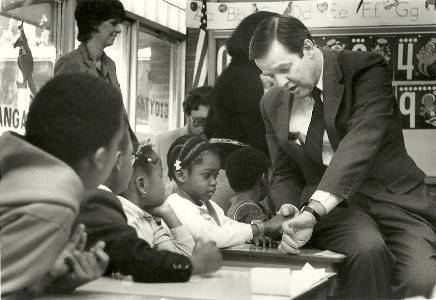Thirty Years Later the Alternate Route Certification Program for Teachers is Still a New Jersey Success Story
Center for Effective School Practices at Rutgers offers this creative teacher certification program in seven counties
Thirty years ago, with little idea of what career path to choose, Mike Harris felt his life resembled a scene from the movie, The Graduate. “I was Dustin Hoffman floating in the pool,” he said, referring to the iconic scene that is so relatable to many recent college graduates.
After graduating from Kenyon College as a religion major, Harris considered applying to law school but only because he had no clear idea of what he wanted to do. He was working in the insurance industry, but was miserable there. “I was thinking every day ‘if I stay in this job for too much longer, I’m going to die,” he recalls.

In September 1984, the state established an alternative system through which districts could recruit talented individuals with liberal arts backgrounds who had not studied education in college, and fast track them to careers as elementary and secondary school teachers. Today that program is offered by the Center for Effective School Practices at Rutgers (CESP).
Rutgers University, CESP, introduced the Alternate Route program in 2001 and now offers teacher certification courses in seven counties. An estimated 200 candidates each year go through the program, which takes two years to complete.Rutgers also is the first alternate route program to introduce both online and classroom learning.
“From substitute teachers who love what they do and want to teach full time, to people in the business world and scientific fields who always wanted teach, students come to our program from many diverse places,” says Heather Ngoma, director of Rutgers' Alternate Route.
Through this initiative years ago, Harris was able to become a social studies teacher and later department supervisor at Wallkill Valley High School. Over the years, he guided young teachers in the same way that he had been well mentored by three seasoned teachers in the program. In 2016, he retired from a successful career.
“I would like to thank Gov. Kean for creating the opportunity for someone like me. This is definitely where I was supposed to be in life,” Harris says.
This once novel legislation required radical changes in existing teacher training and certification laws. Under the plan, candidates could become certified teachers by holding a bachelor's degree, passing a state-administered test in their teaching subject and completing a one-year supervised internship in a school district. Education courses were greatly reduced, which addressed a concern over the quality of public education in the 1970s, a time when elementary teaching candidates could graduate without taking a single course in science, math or history.
Today the alternate route program is an integral part of the state's teacher employment system and has enhanced the diversity and size of the state's teacher candidate pool. It is considered an education success story and has been replicated in programs nationwide.
“It has been a home run. The success of the program has overwhelmed earlier criticism. Most of the country was initially against it, and now it is widely accepted. The tremendous surge in interest that it received confirmed what a good idea it was, and we have not had a teacher’s shortage in the state since then. One of the best things it did was in the area of science instruction. Many scientists decided to make the shift to teaching,” says Gov. Kean.
Nick Porta, who received a bachelor’s degree in environmental science in 2014, is in the last phase of completing the program at Rutgers and was nominated as one of the students of the year in 2015. After working as an outdoor education teacher following his college graduation, Porta realized his love of teaching. He is now a seventh and eighth grade biology teacher at Philip’s Academy Charter School in Newark and credits the Rutgers program with help in his first year.
“The program had a significant impact on me. I was surrounded by other teachers going through the same thing and we were able to share our hurdles and experiences and receive solid professional advice. It was not just a class, but also a support group in a way,” he says.
In one session Porta shared an anecdote about students throwing their trash across the room into the waste basket, like basketball free throws. While humorous, the story also related to classroom management, an area of work for many new teachers. After brainstorming ideas with the class, Porta placed the can right next to him while teaching, and even the most daring student did not risk a toss.
“The first year of teaching was an emotional rollercoaster, but this year is a lot easier.I left there with many strong relationships.”
Media Contact:
Beth Salamon
732-932-6990 x611
bsalamon@docs.rutgers.edu